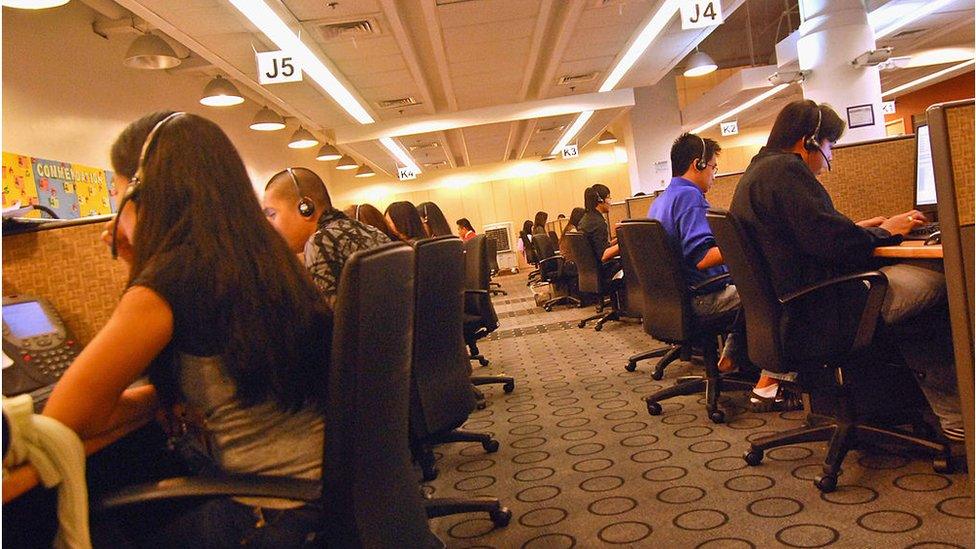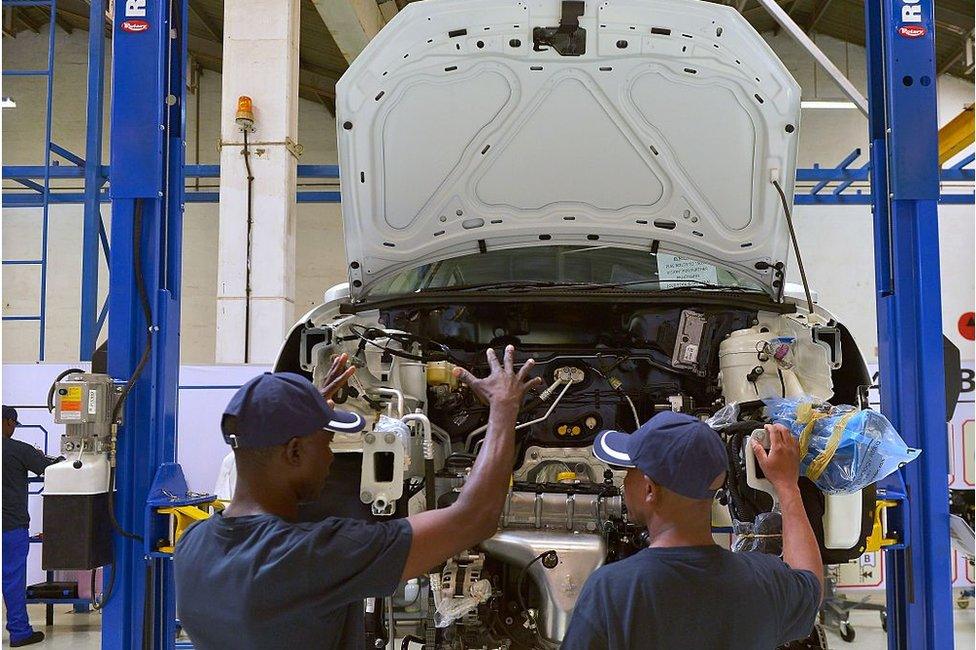Will AI kill developing world growth?
- Published

Could AI mean fewer opportunities for work in Africa?
Artificial intelligence (AI) could displace millions of jobs in the future, damaging growth in developing regions such as Africa, says Ian Goldin, professor of globalisation and development at Oxford University.
I have spent my career in international development, and in recent years have established a research group at Oxford University looking at the impact of disruptive technologies on developing economies.
Perhaps the most important question we have looked at is whether AI will pose a threat - or provide new opportunities - for developing regions such as Africa.
Optimists say that such places could use rapidly advancing AI systems to boost productivity and leapfrog ahead.

Automated systems are already getting higher customer satisfaction ratings than people in call centres
But I am becoming increasingly concerned that AI will, in fact, block the traditional growth path by replacing low-wage jobs with robots.
As Kai-Fu Lee, a Beijing-based venture capitalist who invests in artificial intelligence, tells us, AI is potentially the most revolutionary technology to emerge this century. It is also, along with the associated technologies of machine learning and robotics, advancing at breakneck speed.
Already AI has the capacity to replace many work tasks that are rules-based and repetitive, and which do not require great dexterity or empathy.
In developed economies, for instance, robots have replaced well over half of the jobs in the car and related industries in recent decades.

Many jobs in the car industry have been displaced by robots
Automated systems are already getting higher customer satisfaction ratings than people in call centres, threatening a key source of jobs in many countries.
Similarly, AI enabled systems are leading to significant job losses in back-office administrative functions in banking, health, insurance and accounting. These are roles that had in recent years been outsourced to developing countries such as India, Vietnam, South Africa and Morocco.
Jobs at risk?
According to our research at Oxford, about 40% of jobs in Europe are vulnerable to AI over the coming decades, almost half of jobs in the USA, and an even greater share in developing countries.
Some argue that AI will create as many new jobs as those lost to robots, and that we shouldn't worry too much. But I believe that those new jobs will be concentrated in certain parts of the developed world, and that the developing world will miss out.

Global Trade

This matters most acutely in poorer nations that have used their relatively low-cost labour force as a first stage in catching up with the developed economies, examples being China, Thailand and Vietnam.
Most of the jobs at threat in such places would be of the semi-skilled variety. But the fact that poor countries also tend to suffer shortages of highly skilled labour could further undermine their competitiveness.

Incomes have soared in tech hubs like San Francisco
The development of supplementary technologies will add to the challenge. 3D printing, will combine with AI to allow consumers in rich countries to manufacture individually customised clothes, shoes, devices and other products, by themselves, much closer to home.
The rise of such production could mean that the age of outsourcing production to developing countries is drawing to a close.
Guy Ryder, director general of the UN's International Labour Organisation, highlights how the politics of protectionism will accelerate this. The demand to repatriate manufacturing to advanced countries has never been higher, although it is not jobs but AI and robotic processes that are coming home.
Growing inequality
As technology plays an increasingly dominant role in the global economy, the parts of the planet driving technological development stand to gain even more power. Just look at the concentration of wealth and incomes we have seen in places such as Silicon Valley.
This trend could be replicated globally, worsening inequality. Due to the difficult to measure and cross-border nature of the digital economy, government tax revenues have been undermined, reducing investment in infrastructure, health and education.

A handful of big companies have come to dominate the tech industry
The tech industry also sucks up talent from around the globe, leaving shortages of human capital in some countries. All economies now require highly skilled workers to work in areas like AI, but these globetrotting individuals tend to prefer living in safe and developed cities that offer the best career opportunities.
With some notable exceptions - such as Bangalore in India - poorer countries will find it harder to attract and retain such workers, leaving them even more vulnerable.
This concentration effect is not just evident in terms of location, but among companies themselves too.
For example, just a handful of firms, based mainly in the US and China, now dominate AI, meaning that even European and Japanese businesses struggle to compete.
A silver lining?
Is all lost? Perhaps not. New firms are emerging that aim to use AI to boost growth and productivity in developing economies. They are also allowing citizens to access education, health, employment and other opportunities.
One such company is M-Pesa, a mobile phone-based money transfer service, whose platform is used by more than 60% of Kenyans. M-Tiba, another Kenyan app, uses similar technology to deliver health services to more than four million people.

Money transfer app M-Pesa is used by more than 60% of Kenyans
Some experts believe that AI could yield the same disruptive benefits as mobile phone technology in the developing world, helping to overcome the absence of infrastructure that contributes to low incomes and stalled development.
Recent reports from the Pathways for Prosperity Commission and the World Bank similarly argue that AI and the digital economy could provide education, as well as jobs and incomes for people in poor countries, including those in isolated rural areas.
However, it's early days for many of these companies, and it's not yet clear if they will succeed. It's also unclear whether the positive experiences in a handful of countries such as Kenya can be replicated elsewhere, and whether the positives outweigh the threats, not least in terms of lost jobs, tax revenues and rising inequality.
The clock is ticking and the risks posed by AI to development have never been higher. Policymakers everywhere should be listening carefully and thinking hard about how to respond.
Ian Goldin is professor of globalisation and development at Oxford University. His BBC World Service documentary, Will AI Kill Development, is available on the BBC iPlayer.